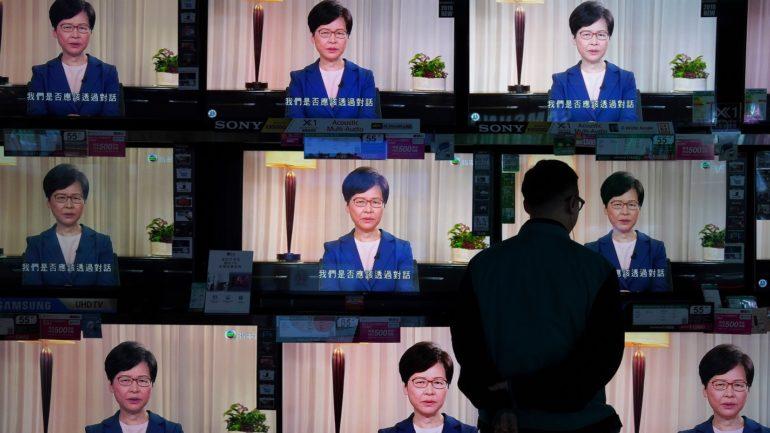Hong Kong Government Withdraws Controversial Extradition Bill, but Strife Continues
By Patrick Frater
LOS ANGELES (Variety.com) – The Hong Kong government has moved to officially withdraw the controversial extradition bill that sparked three months of protests and information warfare.
The move to withdraw the bill was announced in a pre-recorded televised address Wednesday afternoon by Carrie Lam, the Chinese territory’s chief executive. Lam also announced the establishment of a dialog platform to probe society’s ills.
Initial reactions from many quarters were a mixture of relief and disappointment. On the Stock Exchange, the Hang Seng Index leaped 3.9% to 26,593. But opposition lawmaker Claudia Mo said that the measures are “too little and too late.” Another, more centrist lawmaker, Michael Tien, called it “the right decision at the wrong time.”
Lam’s attempted introduction in June of an extradition bill that would have eroded the legal firewall between Hong Kong and mainland China ignited a wave of protests. Some 1.7 million people – nearly a quarter of Hong Kong’s population – took to the streets on June 16 after Lam fluffed a previous attempt to deal with public concerns about the bill.
The protest movement, though officially leaderless, came up with five demands. They included Lam’s resignation and a judge-led investigation into the actions of the police, who have been accused of excessive force in dealing with the demonstrations. Other protesters have called for the fully democratic election of Hong Kong’s leaders, while a small faction has demanded some kind of independence.
Hong Kong was a former British colony that returned to Chinese control in 1997 under an agreement that Hong Kong could keep its separate legal system and freedoms for a period of 50 years. The arrangement is known as “one country, two systems.” Opponents of the extradition bill said that the arrangement would be threatened by it.
The civil strife has also engulfed the entertainment industry.
Companies and members of the film industry have been forced to choose whether they are in the pro-Beijing camp or supportive of the protesters. The decision carries the risk of being ostracized by mainland producers, distributors and regulators or of backlash in Hong Kong.
Singer-actress Denise Ho and actor Anthony Wong have put themselves firmly in the democratic Hong Kong camp. Former Hong Kong icon Jackie Chan and Disney’s U.S. passport-holding “Mulan” star Crystal Liu Yifei have echoed Beijing’s nationalist rhetoric.
Hong Kong’s Motion Picture Industry Association has also found itself in the crossfire. Last month it was accused of spreading “white terror” (a reference to the suppression of civil liberties under 1970s martial law in Taiwan) when it issued a memo last month questioning the wisdom of Hong Kong film companies submitting movies to the Golden Horse Awards, the most prestigious film prizes in the Chinese-speaking world, which take place in Taiwan. ’s National Film Authority has issued orders for mainland films and talent to boycott the awards following last year’s ceremony, at which a prize-winner advocated Taiwanese independence.
The protests in Hong Kong have seemingly had little impact on theatrical box office. The motion picture association reported only a 1.9% drop between July 1 and Aug. 31 compared with the summer period last year.
The standoff between government and citizens has shaken Hong Kong society to its roots.
Accusations of police brutality, selective prosecution, undermining of free speech and the media, and government collusion with organized crime gangs have all taken root. Meanwhile, some authorized protest marches turned violent. Other marches went ahead in defiance of bans.
The fight has been as much in the media and on social media as much as on the streets. To communicate, protesters turned to more secure apps such as Apple’s Airdrop, Russian-developed Telegram, and the Bluetooth-based Bridgefy, which uses a mesh network for distant connections.
The Hong Kong government responded by infiltrating the protesters’ online groups and by stepping up its own barrage of messaging through government-backed media, SMS, and private sector media loyal to Beijing. The Chinese government has largely blocked coverage of the unrest on the mainland but has launched a propaganda offensive in Hong Kong and abroad, labeling protesters as violent separatists.
That caused Facebook and Twitter to shut down more than 200,000 accounts which Twitter called a “coordinated state-backed operation” of misinformation. Facebook said offending parties were involved in “coordinated inauthentic behavior” and had links to individuals with ties to the mainland Chinese government.
The Hong Kong government’s decision to withdraw the extradition bill came just a day after media caught Lam in a situation that was at best contradictory and at worst a lie.
On Monday, the Reuters news agency published a recording of Lam telling business leaders in a closed-door meeting that she would step down if she had the choice. On Tuesday, Lam denied that she had tried to quit. Other sources speculated that the audio recording had been leaked by Beijing in a bid to distance itself from the “unforgivable havoc” seen in the city.

